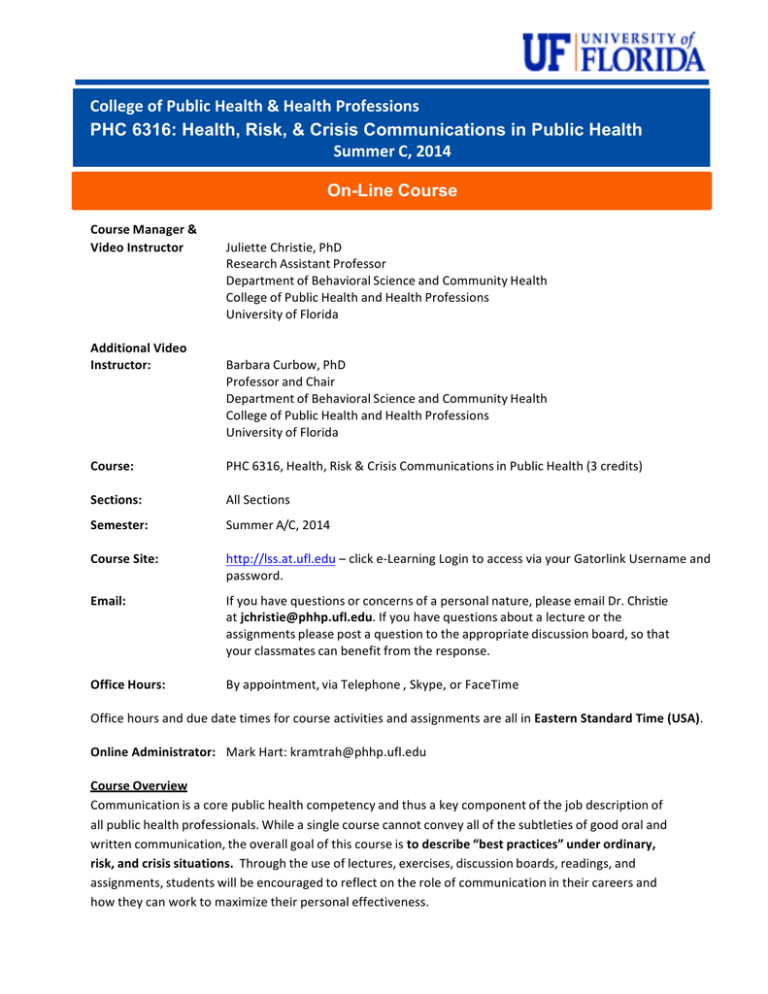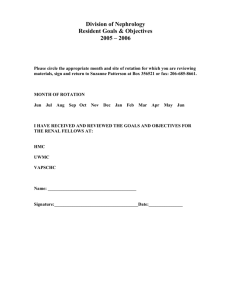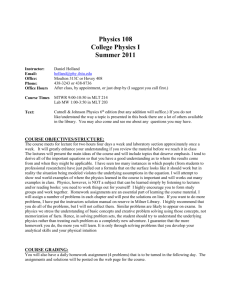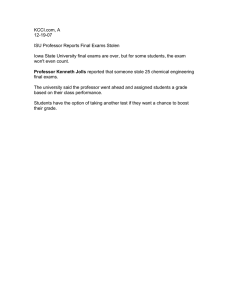Document 12096924
advertisement

College of Public Health & Health Professions PHC 6316: Health, Risk, & Crisis Communications in Public Health Summer C, 2014 On-Line Course Course Manager & Video Instructor Additional Video Instructor: Barbara Curbow, PhD Professor and Chair Department of Behavioral Science and Community Health College of Public Health and Health Professions University of Florida Course: PHC 6316, Health, Risk & Crisis Communications in Public Health (3 credits) Sections: All Sections Semester: Course Site: Summer A/C, 2014 Email: If you have questions or concerns of a personal nature, please email Dr. Christie at jchristie@phhp.ufl.edu. If you have questions about a lecture or the assignments please post a question to the appropriate discussion board, so that your classmates can benefit from the response. http://lss.at.ufl.edu – click e-­‐Learning Login to access via your Gatorlink Username and password. Office Hours: By appointment, via Telephone , Skype, or FaceTime Office hours and due date times for course activities and assignments are all in Eastern Standard Time (USA). Online Administrator: Mark Hart: kramtrah@phhp.ufl.edu Course Overview Communication is a core public health competency and thus a key component of the job description of all public health professionals. While a single course cannot convey all of the subtleties of good oral and written communication, the overall goal of this course is to describe “best practices” under ordinary, risk, and crisis situations. Through the use of lectures, exercises, discussion boards, readings, and assignments, students will be encouraged to reflect on the role of communication in their careers and how they can work to maximize their personal effectiveness. Juliette Christie, PhD Research Assistant Professor Department of Behavioral Science and Community Health College of Public Health and Health Professions University of Florida Course Objectives By the completion of this course, students should be able to: 1. Differentiate between health, risk, and crisis communication. 2. Explain the basic theoretical foundations of health communication. 3. Apply persuasive communication strategies to design different types of public health communications. 4. Discuss the ethical and professional issues surrounding the use of communication techniques. Course Materials The Online Learning Environment It is important that students become familiar with this syllabus and the course requirements. Since we do not meet weekly in a classroom, I am not able to provide weekly reminders of impending due dates for assignments, projects, etc. This is your responsibility. Before starting the course you are required to take a Syllabus & Project Quiz (Due May 18). This quiz is posted in Sakai under the Exams link. If you do not get a perfect score on the quiz, I strongly encourage you to review the answers and ask questions to ensure you understand, at the start of the semester, the course requirements. For one assignment in the course, students will be asked to use AdobeConnect. It is recommended that you test your computer prior to the meeting date of this assignment. You can do this by going to http://admin.adobeconnect.com/common/help/en/support/meeting_test.htm. The Connection Test checks your computer to make sure all system requirements are met. If you pass the first three steps of the test, then you are ready to participate in a meeting. If you do not pass the test, perform the suggested actions and run the test again. To ensure students are able to connect successfully, one question on the quiz will involve the use of AdobeConnect. Required Textbooks Benoit, W.L. & Benoit, P.J. (2008). Persuasive messages: The process of influence. Malden, MA: Blackwell. Zaremba, A.J. (2010). Crisis communication: Theory and practice. Armonk, NY: M.E. Sharpe. Required Articles The following articles, in order of use, are provided on the course website under the weekly modules where they are assigned. Glik, D.C. (2007). Risk communication for public health emergencies. Annual Review of Public Health, 28, 33-­‐54. Finkel, A.M. (2008). Perceiving others’ perceptions of risk. Still a task for Sisyphus. Annals of New York Academy of Science, 1125, 121-­‐137. Bostrom, A., Anselen, l., & Farris, J. (2008). Visualizing seismic risk and uncertainty: A review of related research. Annals of New York Academy of Science, 1128, 29-­‐40. Peters, E. (2008). Numeracy and the perception and communication of risk. Annals of New York Academy of Science, 1128, 1-­‐7. Course Requirements/Evaluation/Grading The following components comprise the evaluation for this course, for a total of 400 points. Detailed instructions for each component are provided in the “assignments” link in Sakai. Students also have the opportunity to earn up to 6.5 bonus points to supplement their grade (see details below). Evaluation Components 1-­‐4: 1. Part A: Persuasive Essay (25 points) Using skills gained from the first 3 lectures, students will craft a brief (no more than 500 words) persuasive essay on a topic of their choice. Using “track changes” (or a similar program) students will add “comments” that highlight the persuasive techniques they are employing in their essay. Due: JUN 8, 2014 Part B: Persuasive Speech (25 points) After crafting your persuasive essay and identifying its persuasive components, students will orate their speech using AdobeConnect to record and share their speech with classmates. Due: JUN 11, 2014 2. Public Health Crisis Communication: A Case Analysis (100 pts) Students will select a public health crisis and provide an overview of the crisis, approximate timeline of messages communicated, and analysis of mistakes made while a major stakeholder communicated about the crisis, and provide an outline for a better crisis response. This is the major assignment for the course. Detailed instructions for the case analysis are available via the assignment link in Sakai. Due: JUL 27, 2014 3. Discussion Board (40 total points) 8 @ 5 points each Each week discussion topics will be posted on the discussion board. Students are expected to provide thoughtful responses to eight of these postings as well as comment/ask questions to at least one other student’s post during that same week. Discussion board posts will be graded on quality of your original response and the quality of your comment/questions posted to peers. Select your 8 discussion boards by using the “Sign Up for Discussions” tool in Sakai (located on the left menu bar). Selections are final. If you miss a discussion board (see weekly due dates) you will receive 0 points for that week toward your final grade. Select your topics by 11:55pm, May 19, 2014. Discussion board topic close dates are posted in the course outline. Due: Various Dates 4. Exams (2 @ 100 points each) There will be two exams. Each exam will be worth 100 points. The exams will cover material presented in the text, lectures, and supplemental materials. The exams may include multiple choice, short answer, and essay questions. Each exam will be limited to 90 minutes. Both exams are closed note, closed book. The online MPH program uses a proctoring service for all graded exams. Refer to a later section in the syllabus “ProctorU” on instructions for using this service. Exam 1: JUN 16 – 22, 2014 Exam 2: AUG 2 -­‐ 8, 2014 BONUS POINTS During each lecture Drs. Christie or Curbow will pose one or more “thought exercises” for students to complete. Students will gain ½ point for every thought exercise they complete and submit, for a maximum possible total of 6.5 points added to final course grades. Thought exercises will be posted with the weekly lecture materials. Check for Thought Exercise due dates in the course outline and listed in Sakai under assignments. Thought exercises will not be accepted late. Points % of Total Grade Due Date Evaluation Component Syllabus & Project Quiz 10 2.5% MAY 18 Persuasive Essay 25 6.3% JUN 8 Persuasive Speech Case Analysis Discussion Board Exam 1 Exam 2 Total 25 100 6.3% 25% JUN 11 JUL 27 40 10% VARIOUS 100 25% JUN 16 -­‐ 22 100 25% AUG 2 -­‐ 8 400 100% Grading Scale Total Course Points Percent of Course Points (out of 100%) Letter Grade Point Equivalent Grade 372-­‐400 93-­‐100% A 4.0 360-­‐371 90-­‐92% A-­‐ 3.67 348-­‐359 87-­‐89% B+ 3.33 332-­‐347 83-­‐86% B 3.0 320-­‐331 80-­‐82% B-­‐ 2.67 308-­‐319 77-­‐79% C+ 2.33 292-­‐307 73-­‐76% C 2.0 280-­‐291 70-­‐72% C-­‐ 1.67 268-­‐279 67-­‐69% D+ 1.33 252-­‐267 63-­‐66% D 1.0 240-­‐251 60-­‐62% D-­‐ 0.67 Below 239 Below 60% E 0.0* *WF, I, and S-­‐U = 0.0 For greater detail on the meaning of letter grades and university policies related to them, see the Registrar’s Grade Policy regulations at http://www.registrar.ufl.edu/catalog/policies/regulationgrades.html Late Work Policy • Assignments turned in up to 24 hours late will be accepted but the grade for the assignment will be reduced by 15% of the grade you would have otherwise received. • Assignments turned in more than 24 hours late will not be graded and will contribute zero points toward your final grade. • Exceptions to this policy will be made only for reasons that are beyond your control, and preferably discussed in advance of the due date when possible. Examples of these circumstances include: serious illness impacting a significant portion of the time you had to do the assignment, or death in your immediate family (you may be asked for documentation). Examples of circumstances that are generally NOT exceptions include coming down ill the night before an assignment was due or conflicts with work. • Assignments turned in at 11:55:01 PM are LATE. This is how the Sakai programming works. Do not wait until 11:54 PM to submit an assignment unless you understand that the assignment may be marked late. See Notes on turnitin® for time needed to submit an assignment. • It is the responsibility of the student to verify not only that an assignment was submitted, but that an attachment was made, and it was the correct attachment, and in the correct file format. “Turnitin® a feature in Sakai will rate student writing assignments on their originality compared to other published books, journals, websites and other student paper submissions. I will use the results of the turnitin® report to assist in grading the originality of the assignment. Plan Ahead: Turnitin® reports take about 30-­‐minutes to generate. Therefore, students should check back after their submission for an originality score on their submission. If a report is not generated within 2-­‐3 hours, students should resubmit their assignment. If it takes more time to generate the report than the student has left to submit an assignment, the assignment will be marked “late.” I recommend that you allow for sufficient time to submit the assignment. However, let’s have a contingency plan. Students should keep their email receipt, generated by Sakai, when submitting an assignment. Students submit this email if their assignment is denoted “late” when they actually submitted prior to the deadline. This course will be using ProctorU, a proctoring service for graded exams. This service is a user-­‐friendly system, but you must follow these guidelines to register and take your exams: 1. Students must register for a time slot for their course exams with ProctorU starting the second week of the semester, but no later than 3 days prior to an exam. You will register for your exams at www.proctoru.com. Their website will describe how you register and log on for your exam. Your exams will be taken in your Sakai course, but only ProctorU will be able to open the exam for you. Please test your computer connection and equipment via the ProctorU website prior to your exam. 2. Exams will be administered 9:00AM – midnight (Eastern time), seven days a week. 3. Students will need to have a microphone and webcam in place during the test-­‐taking period. An inexpensive webcam and microphone will work fine. ProctorU recommends the Microsoft LifeCam VX-­‐5000 webcam, but most brands or models will work. This webcam, as well as many newer webcams, come complete with a microphone in the camera. Students will NOT be allowed to take an exam without a webcam. (Note: a microphone and webcam are program requirements for the online MPH program, see computer requirements on the program website) 4. Exams may be taken at a student’s home, but students must plan to take their exams in an environment where other people are not in the room with the student during the exam. The proctor will ask to see 2 forms of ID, will ask you some questions to identify yourself, will test your microphone and camera, will ask you to pan your desk and clear it of anything not allowed in the exam. 5. Students will need to have some administrative rights on the computer they are using for the exam to enable the proctoring service to function. Please plan on an extra hour of time to complete the exam outside the scheduled exam time to accommodate connection time with the proctor and any technical issues that arise. 6. The program will pay your proctoring fees, but students will be responsible for late registration fees. For exams scheduled less than 3 days before an exam, they will charge a $5 late fee. 7. It is recommended that students not use a wireless Internet connection for exams. Please consider wire connecting your wireless laptop to your modem for a more reliable Internet signal during the exam. Inexpensive modem cables are available in most electronic stores and online. NOTE: ProctorU will NOT be used for the syllabus quiz. Statement of University’s Honesty Policy (cheating and use of copyrighted materials) Academic Integrity Students are expected to act in accordance with the University of Florida policy on academic integrity (see Student Conduct Code, the Graduate Student Handbook or these web sites for more details: http://www.dso.ufl.edu/sccr/honorcodes/conductcode.php http://www.dso.ufl.edu/studenthandbook/studentrights.php http://gradschool.ufl.edu/students/introduction.html Cheating, lying, misrepresentation, or plagiarism in any form is unacceptable and inexcusable behavior. THE HONOR CODE We, the members of the University of Florida community, pledge to hold ourselves and our peers to the highest standards of honesty and integrity. On all work submitted for credit by students at the University of Florida, the following pledge is either required or implied: “On my honor, I have neither given nor received unauthorized aid in doing this assignment.” For more information please consult the Student Conduct Code, the Graduate Student Handbook or this web site for more details: www.dso.ufl.edu/judicial/procedures/academicguide.php Statement Related to Accommodations for Students with Disabilities Accommodations for Students with Disabilities If you require classroom accommodation because of a disability, you must first register with the Dean of Students Office (http://www.dso.ufl.edu/). The Dean of Students Office will provide documentation to you, which you then give to the instructor when requesting accommodation. The College is committed to providing reasonable accommodations to assist students in their coursework. You must notify the instructor by May 20, 2014 if you are requesting classroom/testing accommodation. All documentation and forms should be submitted to the instructor via email in Sakai. Counseling and Student Health Students occasionally have personal issues that arise in the course of pursuing higher education or that interfere with their academic performance. If you find yourself facing problems affecting your coursework, you are encouraged to talk with an instructor and to seek confidential assistance at the University of Florida Counseling Center, 352-­‐392-­‐1575, or Student Mental Health Services, 352-­‐392-­‐ 1171. Visit their web sites for more information: http://www.counsel.ufl.edu/ or http://www.health.ufl.edu/shcc/smhs/index.htm#urgent The Student Health Care Center at Shands is a satellite clinic of the main Student Health Care Center located on Fletcher Drive on campus. Student Health at Shands offers a variety of clinical services, including primary care, women's health care, immunizations, mental health care, and pharmacy services. The clinic is located on the second floor of the Dental Tower in the Health Science Center. For more information, contact the clinic at 392-­‐0627 or check out the web site at: www.health.ufl.edu/shcc Crisis intervention is always available 24/7 from: Alachua County Crisis Center: (352) 264-­‐6789. BUT – Do not wait until you reach a crisis to come in and talk with us. We have helped many students through stressful situations impacting their academic performance. You are not alone so do not be afraid to ask for assistance. Course Outline Week Dates MAY 12-­‐18 0: 1a: 1b: MAY 19-­‐25 MAY 26-­‐ JUN 1 JUN 2 -­‐ 8 JUN 9-­‐15 JUN 16-­‐22 DUE: May 18, 2013 Syllabus & Project Quiz Thought Exercise #1 Discussion Board #1 2a: 2b: Ethical Issues and Communication Source Characteristics MAY 25, 2013 Thought Exercise #2 Discussion Board #2 DUE: 3a: 3b: Message Content Message Organization and Style DUE: JUN 1, 2013 Thought Exercise #3 Discussion Board #3 4a: 4b: Audience Characteristics: Receivers Receivers: Real Life Issues DUE: JUN 8, 2013 Persuasive Essay (Part A) Thought Exercise #4 Discussion Board #4 5a: 5b: Cognitive Theories of Persuasion Consistency Theories DUE: Jun 11, 2013: Persuasive Speech (Part B) Jun 15, 2013 Thought Exercise #5 Discussion Board #5 Interpersonal Communication Small Group Communication Communication Campaigns 6a: 6b: 6c: JUN 22, 2013 Thought Exercise #6 Discussion Board #6 Exam 1: Available JUN 16 -­‐22 Lectures, Topics, & Activities Overview of the syllabus/assignments Introductory terms and concepts Attitudes, beliefs, behaviors JUN 23-­‐29 DUE: Summer Break Readings B & B: 1, 4 B & B: 3 B & B: 6, 7, 8 B & B: 5, 9 B & B: 2, 10 B & B : 11, 12 Week 8 Course Outline Week of…. JUN 30-­‐JUL 6 Lectures, Topics, & Activities Risk Communication 8a: Fundamentals 8b: Receivers DUE: JUL 6, 2014 Thought Exercise #8 Discussion Board #8 Readings Glik, D.C. (2007) Finkel, A.M. (2008) JUL 7-­‐13 Risk Communication 9a: Source Issues 9b: Message Issues DUE: JUL 13, 2014 Thought Exercise #9 Discussion Board #9 Bostrom, A. (2008) Peters, E. (2008) 9 10 JUL 14-­‐20 11 JUL 21-­‐27 Crisis Communication 11a: Response Options 11b: Ethical Concerns DUE: 12 13 AUG 4– 8 13a: 13b: Crisis Communication: Planning Ahead Course Wrap-­‐Up DUE: AUG 8, 2014 Thought Exercise #13 Discussion Board #13 Exam 2: Available AUG 2-­‐8 Zaremba: 1, 2, 3 Zaremba: 5, 6 JUL 27, 2014 PROJECT: Case Analysis Thought Exercise #11 Discussion Board #11 JUL 28 – AUG 3 Crisis Communication 12a: Team Approach 12b: Talking with media DUE: AUG 3, 2014 Thought Exercise #12 Discussion Board #12 Crisis Communication 10a: Basics 10b: Role of the organization DUE: JUL 20, 2014 Thought Exercise #10 Discussion Board #10 Zaremba: 7, 8 Zaremba: 4, 9





